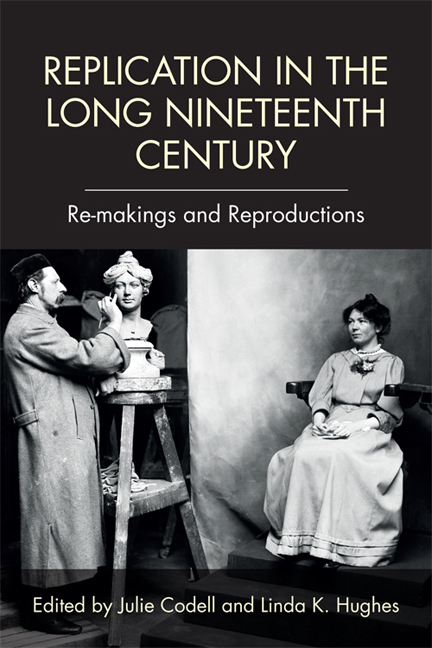Book contents
- Frontmatter
- Contents
- List of Illustrations
- Acknowledgments
- 1 Introduction: Replication in the Long Nineteenth Century – Re-makings and Reproductions
- I Replication and Networks
- 2 Replication of Things: The Case for Composite Biographical Approaches
- 3 Transatlantic Autograph Replicas and the Uplifting of American Culture
- 4 “Petty Larceny” and “Manufactured Science”: Nineteenth-Century Parasitology and the Politics of Replication
- 5 Portraying and Performing the Copy, c. 1900
- II Replication and Technology
- III Replication and Authenticity
- IV Replication and Time
- Notes on Contributors
- Index
4 - “Petty Larceny” and “Manufactured Science”: Nineteenth-Century Parasitology and the Politics of Replication
from I - Replication and Networks
Published online by Cambridge University Press: 11 August 2018
- Frontmatter
- Contents
- List of Illustrations
- Acknowledgments
- 1 Introduction: Replication in the Long Nineteenth Century – Re-makings and Reproductions
- I Replication and Networks
- 2 Replication of Things: The Case for Composite Biographical Approaches
- 3 Transatlantic Autograph Replicas and the Uplifting of American Culture
- 4 “Petty Larceny” and “Manufactured Science”: Nineteenth-Century Parasitology and the Politics of Replication
- 5 Portraying and Performing the Copy, c. 1900
- II Replication and Technology
- III Replication and Authenticity
- IV Replication and Time
- Notes on Contributors
- Index
Summary
At the end of the nineteenth century, the concept of replication took on a central role in the emergence of a new sub-discipline. Replication was both an important part of parasitology's scientific methodology and a locus of anxiety for its proponents, a professional network who, led by Nobel Prize-winning malariologist Ronald Ross, strove for individual recognition and priority. For Ross, a man obsessed with rewriting literary classics, reinventing visual technologies, and reimagining everything from phonetic spelling to mathematics, replication was a fraught concept determined largely by context. As an experimental procedure, it demonstrated consistency and signified truth. As an investigative tool, it embodied not just emulation but also modification and improvement. When used by his competitors, however, it also meant plagiarism, piracy, and fraud. Using Ross's mosquito–malaria work as a case study, I will explore the politics of replication in all its forms – as a scientific methodology, as an ideological motif, and as a framework that exposed the politics of this network of scientists, in their disputes over scientific priority. While in speeches Ross referred to priority as “petty inter-tribal advantage,” it was a qualm that clearly haunted him for his entire career, leading him to write in 1924 that he regretted ever investigating malaria. “Humanity,” he argued, “is not worth it!”
Born to Scottish parents in 1857 in the foothills of the Himalayan mountains in India, Ronald Ross was the eldest of ten children. At the age of eight, he was sent back to Britain for health and education, and – as he tells us in his memoirs – he whiled away his time reading Shakespeare, Milton, Tennyson, Byron, Homer, and the Bible. He struggled with, and eventually got the better of, Euclid. He had “a secret passion for music,” and spent time painting, sketching, and experimenting with watercolor after the style of his father (Ross 1923: 22). In his formative years – and, indeed, well beyond – he was obsessed with rewriting and reimagining famous works, acts that might be thought of as replication. He replicated Cuvier and Buffon's natural histories, drawing up his own taxonomies of the natural world with data “drawn” – probably directly copied – from editions of their books in his uncle, Dr. William Wilmott's, library. He rewrote several Greek myths, as well as reimagining William Gilbert's Pygmalion and Galatea.
- Type
- Chapter
- Information
- Replication in the Long Nineteenth CenturyRe-makings and Reproductions, pp. 67 - 83Publisher: Edinburgh University PressPrint publication year: 2017



